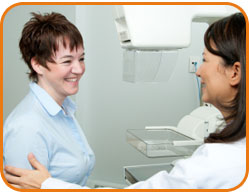Mammography
Mammography is a low dose x-ray that examines the human breast. Mammograms are interpreted
by a trained radiologist.
Mammograms are usually quick and easy to obtain. Routine mammography is recommended
as a screening method to diagnose early breast cancer. Annual screening mammography
should begin at age 40 and even earlier for women at high risk for breast cancer,
according to recommendations from the American College of Radiology (ACR) and the
Society of Breast Imaging (SBI). At this time, mammography along with physical examination
of the breast is the preferred method for the early detection of breast cancer.
Occasionally, ultrasound, magnetic resonance imaging (MRI), positron emission tomography
(PET) and ductography are also used in conjunction with mammography.
|
During mammography, the breast is compressed in order to take an appropriate x-ray.
Although there may be some mild discomfort from this technique, this only last normally
a couple minutes. Patients are discouraged from using deodorants, talcum powder
or lotion the day of the exam as these may show up on the x-ray as calcium.
Often something is found on a screening mammogram that requires further investigation
by the radiologist. A patient is then called back for a diagnostic mammogram that
may require special views or even an ultrasound. Mammogram results are classified
according to the Bi-Rads Assessment Category, often called a Bi-Rads Score. These
range from a 0 (incomplete) to a 6 (Biopsy proven breast cancer).
More often, the special views solve the issue and no further workup is needed. Occasionally,
a biopsy may be recommended for a specific mass, calcifications, or area of concern.
Ultrasound guided biopsies and stereotactic breast biopsies using special x-ray
machines are the two most common methods used by a trained radiologist. These are
two minimally invasive methods that may be performed on an outpatient basis.
The radiologists at the Ernst Radiology Clinic interpret mammography at two locations,
the Center for Diagnostic Imaging in Bridgeton and St. Clare Health Center in Fenton.
Both centers are accredited by the FDA and utilize the most state of the art equipment,
digital mammography. This allows both centers to obtain the best images possible
while utilizing the lowest dose of radiation possible.
|

|
|
|